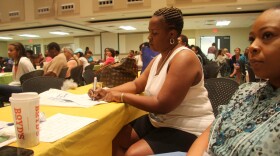In big cities nationwide, female police officers make up about 18 percent of the force. Those numbers may seem low, but they are similar to female enrollment figures in the military.
Austin’s numbers are even lower. Less than ten percent of Austin Police Department officers in Austin are women. APD wants to change that.
Antonia Singletary is a veteran cop with almost thirty years in the force. She is tiny, just 5’2” and around 100 pounds. She looks even smaller standing next to one of the motorcycles she used to use on patrol.
Her size has often been a challenge. But as a cop, she’s learned to perform at the same level of her male peers. Everything has been tougher – not just physically, but also socially. It’s awkward to be outnumbered by hundreds of men.
Still, Singletary – now a commander – says she’s living her dream.
In the first grade, when many little girls dream about castles and princesses, Singletary’s dreams were closer to nightmares. Her father was abusive and often drunk. He would constantly taunt the family with a gun. She remembers a particularly frigid night where she and her siblings were hiding in the woods, until a police officer came to their rescue.
“That night when I went to bed – and even though it [was] very cold – I remember thinking that even just for tonight I felt very safe,” she says. “So, it made an impact.”
Not every girl is as inspired as Singletary was. And the few that choose to join a police force are often discouraged once they make it in.
Ellie Smeal is with Feminist Majority Foundation, an advocacy group that focuses on women’s rights. Over the last thirty years, she’s observed how the internal police culture of most departments is still closed to women.
In the early 1970s, Smeal and the NAACP decided to sue the Pittsburg Police Department because it was not integrated by gender or race. The courts ruled in their favor and issued a consent decree for the police department. Smeal says Pittsburg “went from virtually no women in the incoming class of the police academy to almost 40 percent.”
Twenty years later the decree expired. “And, guess what?” she says. “We went back to almost nothing.”
Commander Singletary knows bringing more women to the force will take a while. That’s one reason why she still hasn’t retired: she sighs and says it’s “because there are no women in the higher ranks for a replacement.”
But she’s hopeful it will happen. Singletary says society, and not just police departments, still places a higher burden on women who choose a life of public service – a life that, despite its challenges, she’s found very rewarding.
The Austin Police Department is holding a female recruitment seminar Saturday at Cornerstone Church, at 10 a.m.




